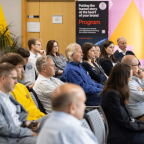
Translation fails and software limitations lead to business losses and negotiation breakdowns
‘I desire the Poles carnally,’ US President Jimmy Carter was interpreted to have said in a speech while visiting Poland in 1977.
And more recently Canadian prime minister Justin Trudeau’s speech on TV was lost in translation with subtitles about ‘Nazi innings’ and various gibberish.
The first mistranslation was down to human error; the second due to speech recognition software limitations.
And digital marketer Philip Graves warns mistranslations are no laughing matter – with serious risks attached, from losing business opportunities to a breakdown in negotiations.
Philip, who is an analyst and copywriter at digital marketing agency GWS Media, Bristol, whose specialities include multilingual websites, and also works at the firm's subsidiary, GWS Robotics, said: “Throughout history we have seen how misinterpretations can lead to disastrous misunderstandings and even bring countries to the brink of war.
“Poor translations can at the very least cause confusion. In some cases, they can cause offence. Clear communication is vital to building trust and where language barriers are involved, accurate translations play a key role.”
Technology and translations
It turned out Carter had said he wanted to learn about the Polish people’s ‘desires for the future’. And Trudeau’s captions, which included bizarre comments such as a ‘portfolio of us old guys’, was said to be due to software misinterpreting French for English.
Philip, who as a child learned computer programming and helped compile a beginner’s guide to the Commodore 64, an early home computer, says even the most advanced technology is not always reliable when it comes to translations.
Philip, who has previously run his own e-commerce business and a community website, said: “The best of today’s automated translation apps, such as Google Translate, attempt to translate in a context-dependent fashion.
“This can be seen when you add or remove words and the translation of individual words changes. But the more complex the phrasing, the more prone they are to misconstruing the entire sense of the sentence.”
How do you do?
The translation of ‘you’, ‘your’ and ‘yours’ from English into other European languages can be problematic as most have a separate familiar and polite form. The familiar ‘you’ should be reserved for family and friends and is inappropriate for business.
Philip said: “I’ve frequently come across programs assuming the familiar form for ‘you’ in translation, which would be unprofessional and disrespectful for business.”
False friends
Philip also highlights the issue of a ‘false friend’- when two words in different languages look or sound similar but differ significantly in meaning. For example, ‘deluso’ in Italian means disappointed, not deluded, ‘hugga’ in Swedish means to stab and not hug, ‘embarazada’ means pregnant in Spanish not embarrassed and ‘demander’ in French means to ask and not to demand.
The latter led to inflamed talks between Paris and Washington in 1830 after a secretary translated a message to the White House as ‘the French government demands’. The US President took issue with what was seen as a set of demands.
Philip, a published author who studied mathematics and economics in Sweden, said: “Linguistic false friends can be dangerous as they can convey a different message than the one intended.
“While well-programmed automated translations are unlikely to make such basic mistakes, they struggle a lot more with words in any language that have multiple meanings depending on context.
“For this reason, it is important that the output of any automated translation tools should be proofed by a native speaker or university graduate-level secondary speaker of the language concerned.”
The benefits of multilingual websites
But Philip points out that multilingual websites have many benefits if their translated content is written correctly and can build trust with speakers of other languages.
They can be particularly helpful with search engine optimisation (SEO) for potential overseas customers, as they are likely to conduct searches in their own language.
Philip said: “If you are looking to engage with customers on an international level or even with communities in the UK who do not speak English as their first language, then content in their language of preference shows you are reaching out to them in a welcoming manner and willing to meet them half-way.
“This in turn can help to build a positive image of your brand in their minds and to attract their custom.”








